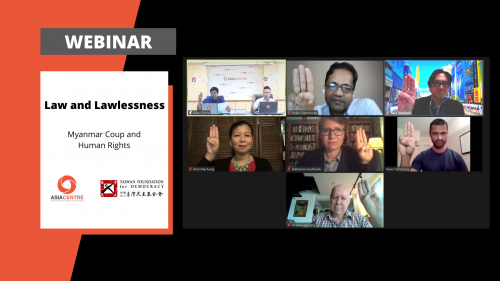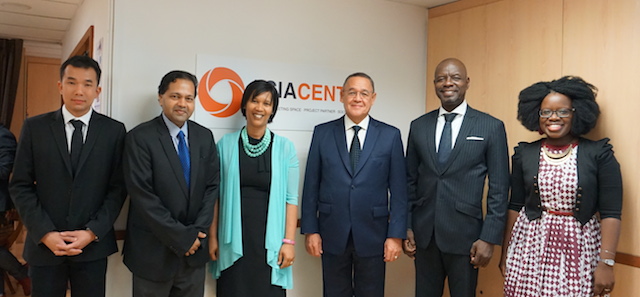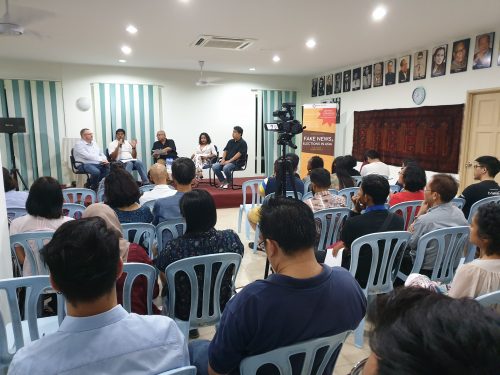
From 21 to 23 August 2024, Asia Centre convened its 9th International Conference on “Shrinking Civic Space in Asia: Stories of Resistance and Pushback”. Held on-site at the Pullman G Hotel in Bangkok, Thailand, the event brought together 120 participants from 27 countries, including members of INGOs, civil society organisations (CSOs), policymakers, and academics. The conference provided a platform for these stakeholders to discuss the challenges to civic space across the region, focusing not only on the difficulties that many actors currently face but also on their stories of resilience and resistance. Against the backdrop of increasing restrictions on freedom of expression, association, and assembly, the conference created a vital space for sharing strategies and fostering collaboration in the ongoing efforts to defend and expand civic spaces in Asia.

Asia Centre’s 9th International Conference was supported by six title partners: the International Development Research Centre (IDRC), Taiwan Foundation for Democracy (TFD), International Center for Not-for-Profit Law (ICNL), Radio Taiwan International (Rti), International Institute for Democracy and Electoral Assistance (International IDEA), and Counterpart International.
The conference also featured six panel partners: the Council of Asian Liberals and Democrats (CALD); Thuraisingam International (Singapore); International Republican Institute (IRI); School of Humanities and Social Sciences of La Trobe University (Australia); Pacifica G.K. (Japan); The Asia Foundation; and the Media Studies and Journalism Department at the University of Liberal Arts Bangladesh (ULAB).
One workshop on digital security was also delivered. This initiative by the Asia Centre, supported by Google, is part of a region-wide project implemented by the Centre to roll out digital security training to high-risk users in twelve countries in the Asia-Pacific.
A total of sixteen panels were organised during the conference, featuring 70 speakers, with a gender distribution of 60% male and 40% female.
On the evening of 21 August, Dr James Gomez, Asia Centre’s Regional Director, welcomed all title and panel partners, panellists, and participants to Bangkok before chairing the inaugural discussion and first plenary session of the conference, Panel 1 of the conference, hosted by Radio Taiwan International (Rti). The panel highlighted the rising importance of global collaboration and solidarity in defending small democracies like Taiwan and Ukraine against authoritarian threats using soft power, art and culture, and supporting their fight for self-determination through inclusive civic spaces and democratic discourses.

On 22 August, the conference commenced with opening remarks from Dr James Gomez of the Asia Centre. This was followed by remarks from representatives of the conference’s title partners. Caroline Ford, Director of the Democratic and Inclusive Governance Division at the International Development Research Centre (IDRC), gave the first remarks, followed by Julie Hunter, Senior Legal Advisor at the International Center for Not-for-Profit Law (ICNL), Cheryl Lai, Chairperson of Radio Taiwan International, Leena Rikkilä Tamang, Director for Asia and the Pacific at International IDEA, and Sarah Little, Governance & Civil Society Specialist at Counterpart International.


The welcome remarks were followed by a Memorandum of Understanding (MoU) signing ceremony between the Asia Centre and the Council of Asian Liberals and Democrats (CALD). Dr James Gomez, Regional Director of the Asia Centre, and Mardi Seng, an elected Senator from Cambodia and CALD’s Chairperson, represented their respective organisations. This MoU marks the renewal of a partnership with CALD that began with the first MoU signed in 2019. Since the Asia Centre’s establishment in 2015, the two organisations have collaborated on evidence-based research and capacity-building activities. With this renewed commitment, the Asia Centre and CALD aim to create more opportunities for strengthening and expanding civic spaces across Asia.

On 22 August, eight panels were convened, addressing a diverse range of topics including governance and civic space, challenges to democracy and mainstreaming inclusivity and diversity in democratic spaces, to highlight the need for inclusive governance, legal protections, and diverse voices to strengthen civil society and uphold democratic values. The panels for Day 1 were as follows:
Panel 2: “Best Practices in Collaborative Governance of Public Emergencies,” hosted by the International Center for Not-for-Profit Law (ICNL);
Panel 3: “Shrinking Civic Space – Lessons from Southeast Asia,” hosted by the International Development and Research Centre (IDRC);
Panel 4: “Criminalization and Prosecution of Changemakers,” hosted by the Council of Asian Liberals and Democrats (CALD);
Panel 5: “Political Parties and Civil Society: Exploring How Opposition Parties Bolster or Undermine the Civic Space,” hosted by the International Republican Institute (IRI);
Panel 6: “National Government-Run Relief Funds and Other Barriers to CSO Resourcing,” hosted by the International Center for Not-for-Profit Law (ICNL);
Panel 7: “Beyond Borders and Ethnicities – Amplify the Voice and Diversity,” hosted by Radio Taiwan International (Rti);
Panel 8: “Fake News and Democracy,” hosted by La Trobe University.
Workshop: “Digital Security Training for High-Risk Users in the Asia-Pacific” hosted by Asia Centre, supported by Google APAC.

On 23 August, eight more panels were convened on empowering the marginalised communities, ensuring the integrity of information, and reclaiming the role of civic actors in shaping democratic futures. The panels for the day were as follows:
Panel 9: “The Vanguards of Change: Challenges and Opportunities for Indigenous Youth and Women,” hosted by International IDEA;
Panel 10: “Strategies for Defending and Expanding Civic Space: Tactics for Building Positive Relationships with Decisionmakers,” hosted by Counterpart International;
Panel 11: “Information Integrity and Digital Public Sphere in Asia,” hosted by the International Development Research Centre (IDRC);
Panel 12: “For Free Civil Activities in Today’s World Where Social Networking Has Become the Norm: A Case Study on Young Generation in Japan,” hosted by Pacifica GK;
Panel 13: “An Antidote to Democratic Decline? Stories of Deliberative Democracy from Asia,” hosted by the Asia Foundation Moderator;
Panel 14: “Legacies of COVID-19 Governance and Impacts on Civic Freedoms,” hosted by the International Center for Not-for-Profit Law (ICNL);
Panel 15: “Navigating and Reclaiming Civic Spaces: Strategies, Support, and Case Studies from Asia and Beyond,” hosted by the Asia Centre;
Panel 16: “A New Dawn for Bangladesh: Success of the Student Movement,” hosted by the University of Liberal Arts Bangladesh (ULAB).
The three-day conference concluded with a final networking opportunity held at Pullman G’s Tiva Restaurant. This closing event featured a happy hour, providing attendees with a chance to discuss ongoing and new projects, as well as potential collaborations. The evening was enhanced by a lively atmosphere, complete with food, drinks, and a live band, offering a celebratory end to three days of meaningful discussions and networking.

In 2025, the Asia Centre will host its 10th International Conference on “AI and Governance in Asia: Civil Society, Democracy, and Media.” This conference will provide a crucial platform for engaging civil society stakeholders in discussions about artificial intelligence, a field currently dominated by government and technology companies. The 2025 conference will also mark a significant milestone for the Asia Centre, celebrating a decade since its inception in 2015. Over the years, the Asia Centre’s annual conference has evolved into a pivotal platform for civil society stakeholders to share their work, exchange ideas, and foster new collaborations, becoming a central nexus to address civil society and human rights challenges and promote collective action in the region.
For more insights into the 9th conference’s title partners and their panels, explore the following links:
Watch the TikTok video highlights of the conference here.
Photos of the conference are now available on the Centre’s Facebook page.
The International Conference is Asia Centre’s annual event where it brings together its partners to share the outcomes of their programmes and network for future collaborations. Over the years, the conference has become a platform for a range of actors to meet and discuss key democracy and human rights issues.
If you would like to become a Conference partner for Asia Centre’s 10th International Conference “AI and Governance in Asia” or explore other collaboration opportunities, email us at contact@asiacentre.org. For more information, click here.
Asia Centre is a civil society research institute in Special Consultative Status with the United Nations Economic and Social Council. It serves as a knowledge partner and undertakes evidence-based research as well as provides capacity-building training for end beneficiaries. If you would like to collaborate with the Centre, please send an expression of interest to contact@asiacentre.org.
Follow Asia Centre’s social media channels for more information.




